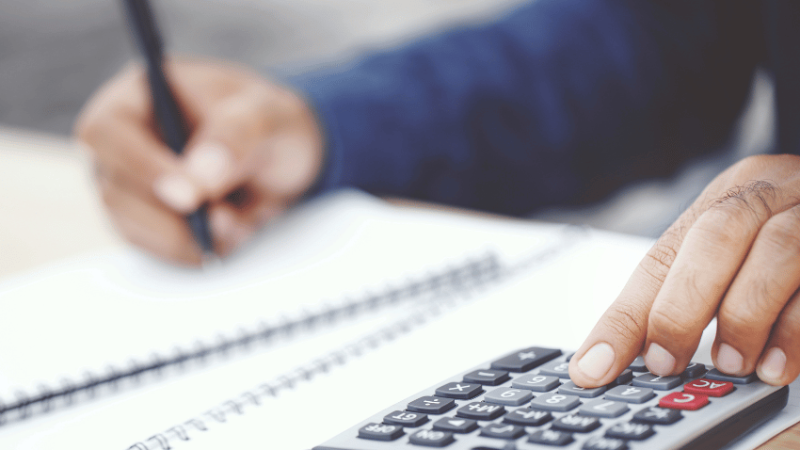GCSE maths games – Best offline and online ideas (with resources)

Give students a break from the books and let them loose with these fun yet educational game ideas…

- by Teachwire
- Classroom expertise and free resources for teachers
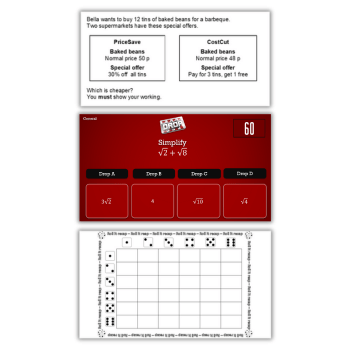
Here are some fun – and free – GCSE maths games from maths teacher Ama Dickson to play in your KS4 lessons. We’ve included all the resources you need. We’ve also included a round-up of fun online games from around the web to try…
Open-ended activities encourage participation by making students feel more comfortable with contributing. So long as you front-load activities with certain behaviour expectations and explicitly clear instructions, you should be able to keep class disruption to a minimum.
(We also have maths games for KS2 and a fantastic maths quiz for KS3/GCSE).
Offline GCSE maths games
Million Pound Drop
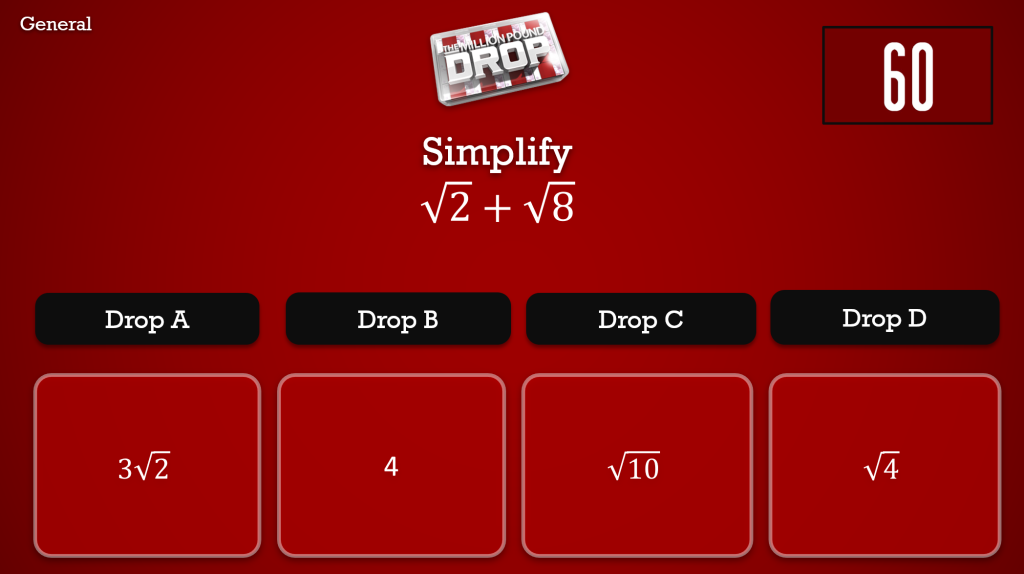
Using the famous TV game show as inspiration, students work in groups to answer multiple choice questions targeted towards high-frequency topics or misconceptions. Play along with our free PowerPoint or edit it to focus on areas of weakness within your class.
Students must bet all of their ‘money’ each round. Any money placed on an incorrect answer is gone. The group with the most money at the end wins.
Tailor group sizes towards how many students there are in your class. If you have any concerns around behaviour management, have students remain in their seating plans and make minimal changes to your usual lesson structure.
Around the room

Change the layout of your classroom so that the tables are pushed back against the walls. Print out our 12 exam questions and place one exam question on each table.
Students work in pairs, under timed conditions, to complete each exam question on an answer sheet. Provide enough time for students to answer each exam question. When half of their time is up, allow them to review some hints on the reverse of the question paper. This will help them reach a solution.
This is an enjoyable activity that requires no supply purchases – just a helping hand able to move some furniture!
Remind pupils that this is an opportunity for them to engage with their peers while strengthening their retrieval practice. This task is also beneficial for teachers. This is because you can create your own questions that target the needs of your specific class if you want to.
‘Roll the dice’ retrieval
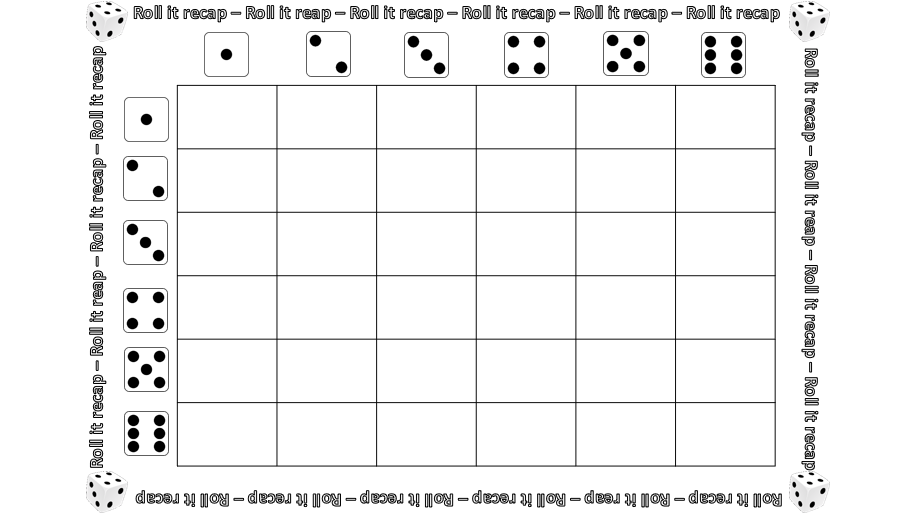
In this GCSE maths game students work in groups of three or four. Each group member using a differently coloured pen.
Each group will require one A3 sheet containing a series of questions laid out in a grid and two dice. Students write their names on the A3 sheet in their chosen colour.
The members in each group then take it turns to roll the dice. The numbers on the dice determine the row and column of the grid they’re using, and hence the corresponding question.
Students answer their assigned ‘grid question’, before the next person in the group then has their go. At the end, the students check their answers to see how many they got correct.
This activity allows for questions to be differentiated to suit different members of each group. With all members using differently coloured pens, you can easily identify those students needing additional support and guide them to the correct answers.
Hit Ten
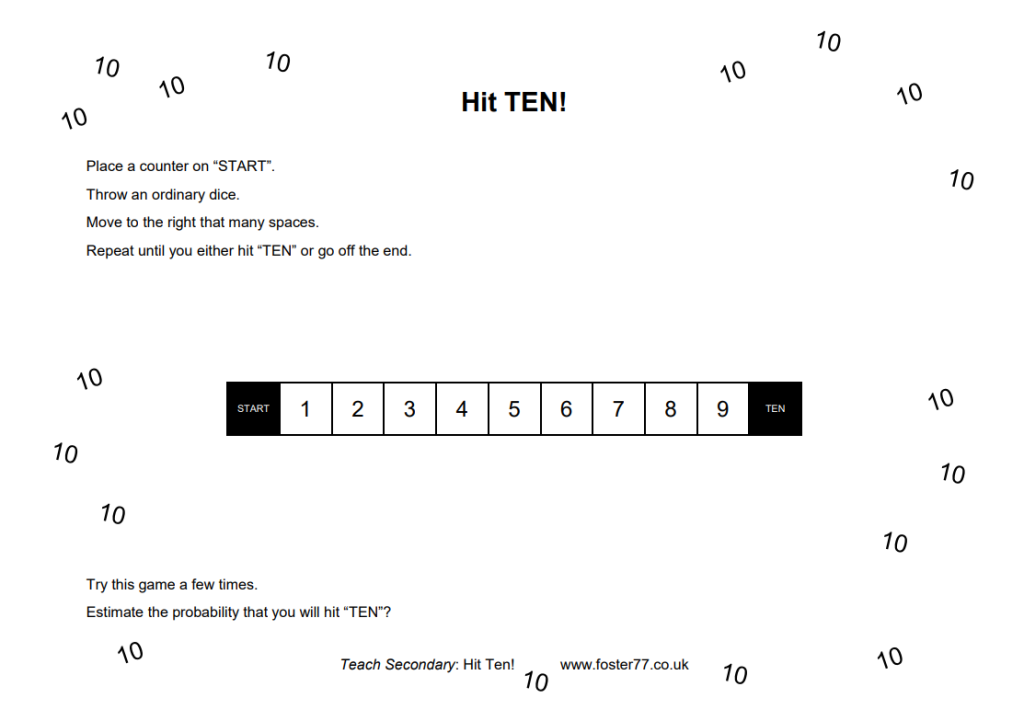
This dice game involves moving ten squares to the finishing point. To win, students must ‘hit ten’ by landing on the tenth square from the start. This game is too complicated for students to work out the probability of winning theoretically, so they must estimate it by playing the game several times and seeing how often they win.
This enables them to calculate how much money they might be willing to pay to play the game, if the prize for winning is £1.
Josephus problem counting game
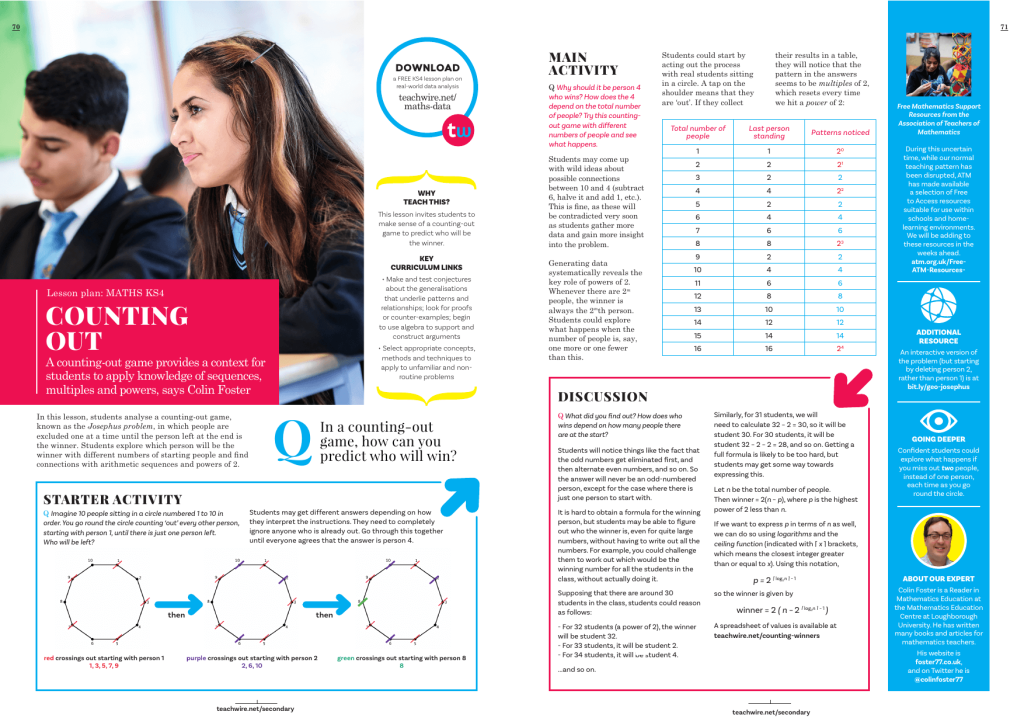
Imagine 10 people sitting in a circle numbered 1 to 10 in order. You go round the circle counting ‘out’ every other person, starting with person 1, until there is just one person left. Who will be left? Try this counting-out game with different numbers of people and see what happens.
Students will need to apply their knowledge of sequences, multiples and powers.
Rap revision

For this GCSE maths game, allow students to use an AI tool like Suno to help them create a song that includes some form of mathematics content or addresses a specific topic.
As the students draw on their creativity to devise fun and catchy songs about unlikely topics, you can provide as much or as little support as needed. For example, you might want to give students a list of keywords to include in their songs.
Let the students choose which genre or style they want to use. If rap isn’t their thing, maybe rock or pop will be.
Even more GCSE maths games
Taboo
Divide students into teams. One team member stands at the front, with their back facing the board. Show a word on your smart board, alongside a series of words in red that students are barred from using as clues.
This can help to improve students’ use of tier 2 and tier 3 vocabulary. They’ll need to articulate what they know and recall definitions whilst collaborating with peers on a common goal.
Pictionary
Divide students into teams. Assign each team a key term that they have to collectively draw and communicate to the rest of the class.
This lets students showcase what they know about a particular topic, be it a quadratic graph, an index number or different parts of a circle.
The Alphabet Game
Students choose a letter. They then try to verbally describe a topic or term beginning with that letter as best as they can.
This game encourages students to think more broadly about the different areas of their maths knowledge – as opposed to working towards what’s usually either a ‘right’ or ‘wrong’ answer.
Online GCSE maths games
Happy learners are engaged learners. Here are some of the best online maths puzzles to help KS4 students practise their maths, either on their own or against a buddy…
Ratio Rumble
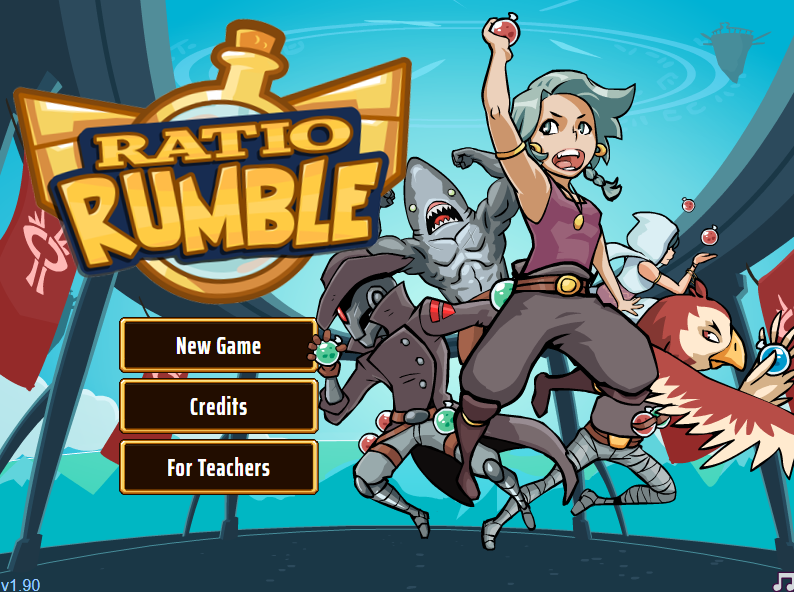
Build your own potions in Ratio Rumble. Students will revise their knowledge of ratios and equivalent ratios.
Choose Your Average
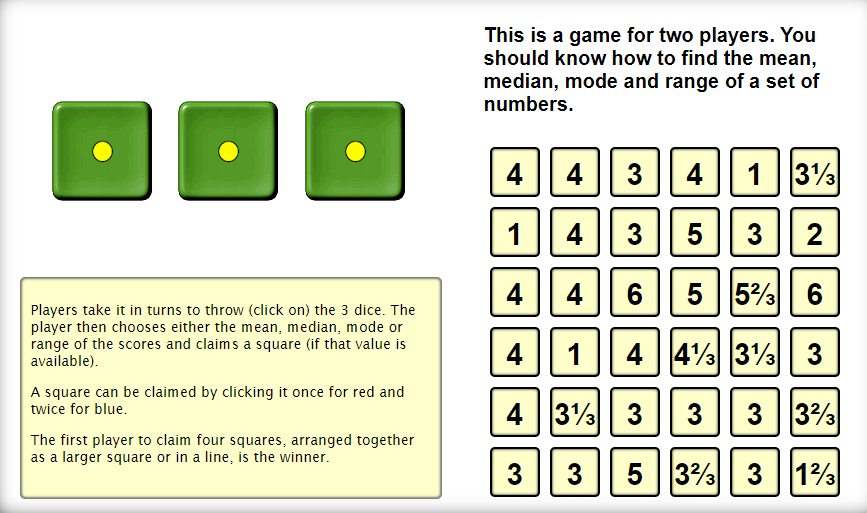
Choose Your Average is a game for two players. Players need to choose either the mean, median, mode or range of the three dice scores and claim a square (if that value is available). The aim is to get four squares in a row.
Four Colour Theorem
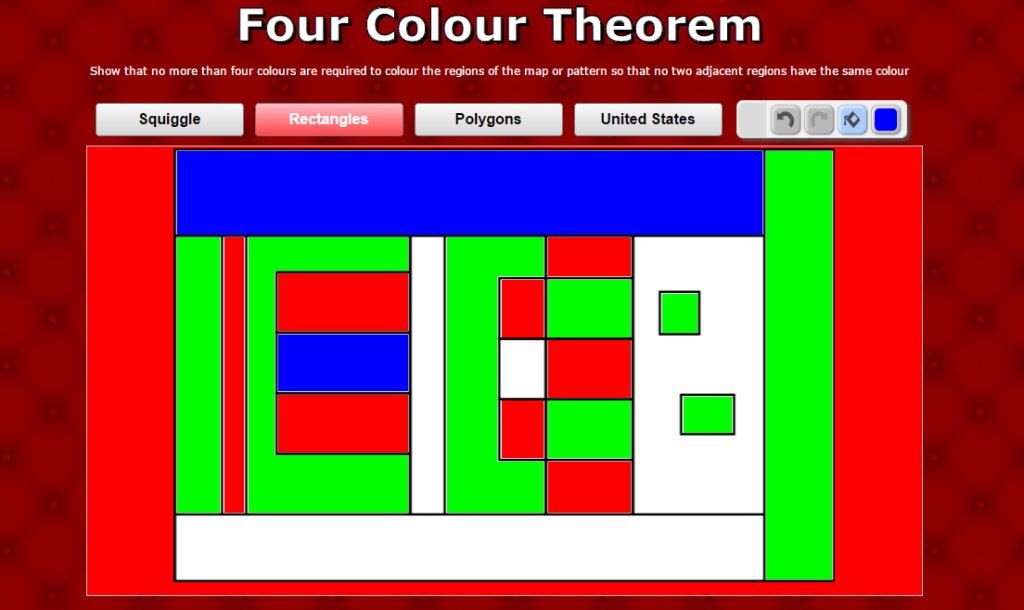
The Four Colour Theorem states that it will take no more than four different colours to colour a map or similar diagram so that no two regions sharing a border are coloured in the same shade.
The first statement of the Four Colour Theorem appeared in 1852 but surprisingly it wasn’t until 1976 that it was proved with the aid of a computer.
Can your students show logical mathematical reasoning to figure out a way to colour these shapes? There’s a rectangle, a squiggle, a polygon and even a state map of the USA.
Algebra Four
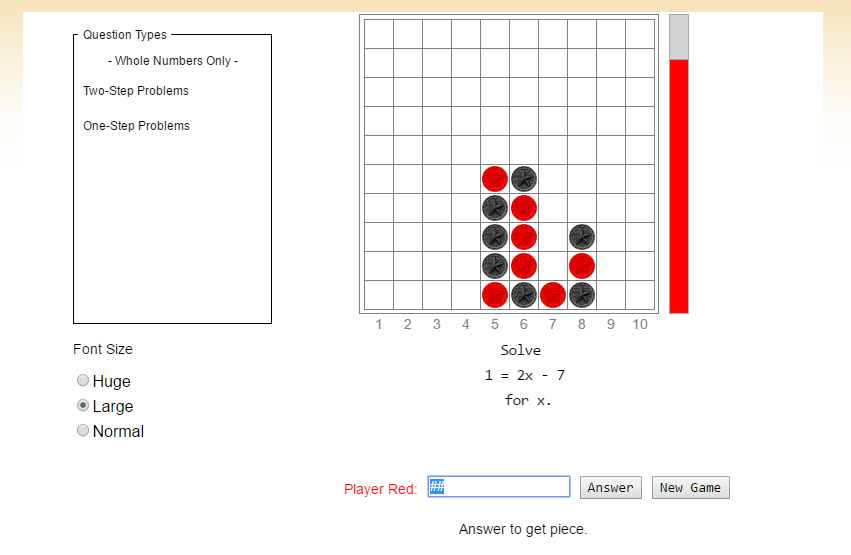
This is an interactive game of Connect 4, except you aren’t automatically given your turn. You have to earn it by answering algebraic equations against the clock.
You can alter the type of questions asked and the amount of time you get to answer so it’s easily differentiated for each pair of learners.
Numerate
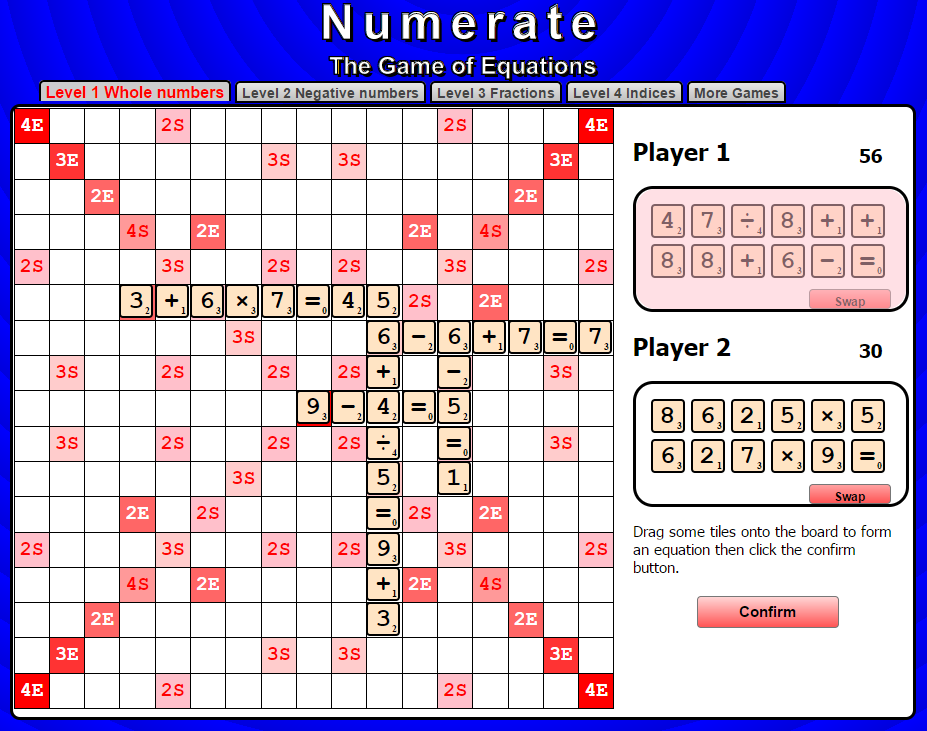
This two-player game works very similarly to a well-known letter-based board game that rhymes with ‘Rabble’. You do have to input your scores manually, and players must check each other’s equations to make sure they work, but that just adds more maths to an already fun endeavour.
Should we planning GCSE maths games at all?
With so many advantages to be had from introducing GCSE maths games into lessons, why are teachers sometimes so apprehensive at the prospect of doing so?
Behaviour issues
For some, there can be concerns that incorporating elements of fun into KS4 lessons may lead to spiralling behaviour issues.
That’s understandable, given that even minor changes to established routines and lesson structures can sometimes cause students to temporarily ‘forget’ about behaviour expectations.
Less learning
There can also be the fear that placing greater emphasis on ‘enjoyment’ could convey the sense that you’re somehow not taking the lesson seriously, thus resulting in students learning nothing from it.
Time pressures
For others, there can be issues surrounding the need for time to plan and prepare such resources. We teachers know how limited we are for time, which can make the process of creating engaging, yet also fun GCSE maths games nigh on impossible.
Then, of course, there are all those other lessons on the timetable that need to be planned, the other resources you’ve got to prepare, the marking you need to stay in top of. It’s hardly surprising when ‘create a fun revision resource’ slips ever lower down the daily priority list.
Costs
A further area of concern surrounding ‘fun’ revision activities is the additional costs they can entail. Supplies for classroom activities can be expensive, and as budgets get ever tighter, that may be an investment that not every department lead is willing to make.
The argument for GCSE maths games
Among all those hours spent partaking in interventions, practising exam-style questions and closing gaps in knowledge, might it be time to consider just how much pressure our Y11 students are under, and find ways of alleviating this without completely taking our foot off the pedal?
When pressures are mounting on both students and teachers alike, it feels as though every activity has to carefully targeted to our classes, every topic delicately hand-picked with the aim of closing gaps and helping our students achieve their full potential.
Sometimes it feels as through there’s no space for our students to ever enjoy their revision.
Incorporating elements of fun into KS4 lessons, via GCSE maths games with a greater emphasis on enjoyment and engagement, serves a serious purpose in relation to revision, retrieval practice and the like.
Integrating GCSE maths games, competitions, songs or quizzes for retrieval practice purposes can increase students’ motivation and engagement and enhance their critical thinking and collaborative skills.
The language and communication techniques used in the course of GCSE maths games develop students’ ability to express themselves, in turn highlighting misconceptions that can then be addressed and corrected.
As teachers, our general aim is for students to enjoy their lessons and associate their learning with positive experiences. So why should revision lessons be any different?
Ama Dickson is a maths teacher and regular contributor to Collins’ series of maths revision guides. She regularly posts maths instruction videos to TikTok as @mathscrunch. Check out our ideas for KS3 and KS4 history games.







